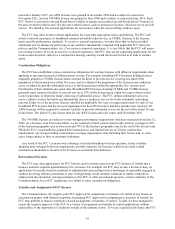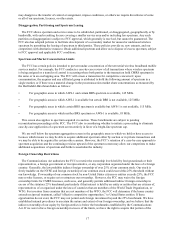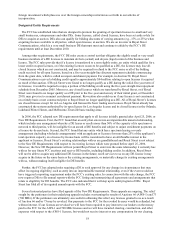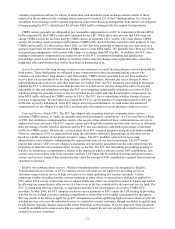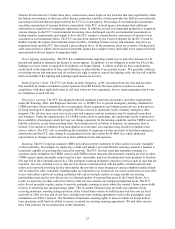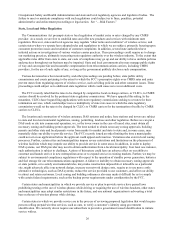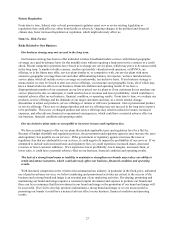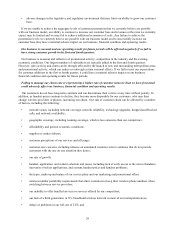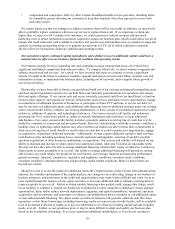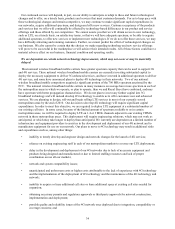Metro PCS 2009 Annual Report Download - page 36
Download and view the complete annual report
Please find page 36 of the 2009 Metro PCS annual report below. You can navigate through the pages in the report by either clicking on the pages listed below, or by using the keyword search tool below to find specific information within the annual report.24
The FCC also has not extended the automatic roaming obligation to services that are classified as information
services (such as high speed Internet services) or to services that are not CMRS, but the FCC is seeking comment on
whether the roaming obligation should be extended to such non-interconnected services or features. If the FCC does
not adopt an automatic roaming requirement for non-interconnected services or features, such as information
services, high speed broadband services, and broadband Internet access services, we could have difficulty attracting
and retaining certain groups of customers, especially to our LTE services.
In its recent approval of the Verizon Wireless purchase of Alltel Wireless, the FCC imposed conditions that allow
carriers like us who have roaming agreements with both Verizon Wireless and Alltel Wireless to use either
agreement to govern all traffic exchanged with the post-merger Verizon Wireless for at least four years after the date
of the closing of the transaction. We have elected to have the Alltel Wireless roaming agreement govern all of our
roaming traffic with the combined Verizon Wireless-Alltel, though Verizon Wireless may take the position that our
right to elect the Alltel Wireless agreement only applies to the rate and not to other terms and conditions. We and
others have asked the Commission to clarify these requirements, to extend the four-year commitment to seven years
and to require post-merger Verizon Wireless to offer automatic roaming for data services and features on a non-
discriminatory basis.
National Broadband Plan. The American Recovery and Reinvestment Act of 2009, or Recovery Act, requires
the FCC to coordinate with the National Telecommunications and Information Administration, and in conjunction
with the Broadband Technology Opportunities Program established by the Recovery Act, the FCC has been tasked
to establish a National Broadband Plan. The Recovery Act states that the National Broadband Plan shall seek to
ensure that all people of the United States have access to broadband capability and establish benchmarks for meeting
that goal. The National Broadband Plan is expected among other things, to determine whether additional spectrum
is required for wireless broadband services. Congress directed the FCC to produce the National Broadband Plan by
February 17, 2010, but the FCC has requested a 30 day extension of this date. As a result, the date by which the
plan will be finalized is not certain. A number of industry participants, including the primary wireless industry
association, have indicated that the FCC should identify and auction an additional 800 MHz or more of wireless
broadband spectrum in the next decade. In a recent speech, the Chairman of the FCC, indicated that the National
Broadband Plan will include an initiative to identify and auction an additional 500 MHz of spectrum over the next
decade.
Wireless open access. A provider of VoIP services has asked the FCC to issue a declaratory ruling that would
give wireless broadband mobile customers the right to utilize any device of their choice to access a wireless
broadband mobile network as long as the device did not cause interference or network degradation and the FCC has
placed this request on public notice. The petition also seeks to enable customers to run applications of their choice
on wireless broadband mobile networks. This so-called “Wireless Carterfone Rule” is opposed by many wireless
broadband mobile interests, including us and the Wireless Industry Association, CTIA. The proponent also
requested that the FCC initiate proceedings to determine whether the current practices of wireless broadband mobile
carriers comport with the Communications Act. The adoption of such a rule for existing networks could permit third
parties to run applications on our network that consume large amounts of airtime and/or bandwidth. Our fixed price,
unlimited service is not well-suited to such applications and a mandate of this nature could substantially impede our
business.
Net Neutrality. In October 2009, the FCC issued a notice of proposed rulemaking seeking comment on codifying
its existing Internet policy principles, adding further principles of nondiscrimination and transparency, a possible
acknowledgement that these principles apply to all forms of broadband Internet access, including wireless access,
and principles governing so called “managed” or “specialized” services. The FCC has proposed that the
nondiscrimination principle would prohibit broadband Internet access service providers, including wireless access
providers, from favoring or disfavoring lawful content, applications, or services accessed by their subscribers, but
would allow broadband providers to engage in reasonable network management. The transparency principle as
proposed by the FCC would require providers of broadband Internet access service to make available relevant
information regarding network management practices to the consumers who purchase their service; to content,
application, and service providers, who must ensure that their offerings function on the Internet; and to the
Commission. The FCC has proposed that all of the principles would be subject to reasonable network management
and the needs of law enforcement, public safety, and homeland and national security. The FCC has sought comment
on whether these proposed rules should apply to all Internet access service providers and whether such proposed
rules should apply to all broadband Internet access services provided by such providers. The proposed net neutrality
rules have generated voluminous comment, much of it supportive, but also has drawn harsh criticism from several
segments of the telecommunications industry, including most wireless carriers. The likely outcome and timing of




